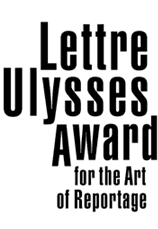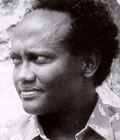
Abdourahman Waberi, Djibouti/ France

Novelist, journalist, essayist, poet. Abdourahman A. Waberi was born in 1965 in Djibouti. He spent his childhood and adolescence in Northeast Africa. He was 12 years old when Djibouti declared its independence in 1977. He was lastingly influenced by this upheaval and saw himself as a "contemporary" of his country, to which he wished to maintain a literary obligation. In 1985, he left Djibouti, which he called a "miniature republic" and went to Caen in France to study English language and literature.
Waberi is the author of numerous novels, essays, articles, and travel reports. His articles, short stories, and reviews are published in many international newspapers, including Le Monde diplomatique, Africultures, Le Monde, Libération, Le Nouvel Observateur, Jeune Afrique Economie, DU, Grand Street, and Lettre International.
Waberi's first volume of stories Le Pays sans ombre (Land without Shadows) was published in 1994 and in the same year received the Grand prix de la Nouvelle francophone from the Académie Royale de Langue et de Littérature Française de Belgique and the Prix Albert Bernard of the Académie des Sciences d'Outre-mer de Paris. In 1996, another volume of stories followed Cahier nomade (Nomad Notebook), which received the reputed prize Grand Prix Littéraire de l'Afrique noire. Waberi's first novel Balbala was published in 1997.
In 1998, the organizer of the festival Fest'Africa in Lille invited Abdourahman Waberi to come to Kigali in the context of the project Rwanda: écrire par devoir de mémoire. With 9 other writers as well as a film director and a sculptor, he attempted to artistically address the 1994 genocide in Rwanda. This resulted in the book Moisson de Crânes: textes pour le Rwanda, reflections about the Rwandan genocide.
Waberi's books have been translated into German, English, Italian, Spanish, and Serbian.
He lives with his family in Caen, Normandy, where he works as an English teacher.
